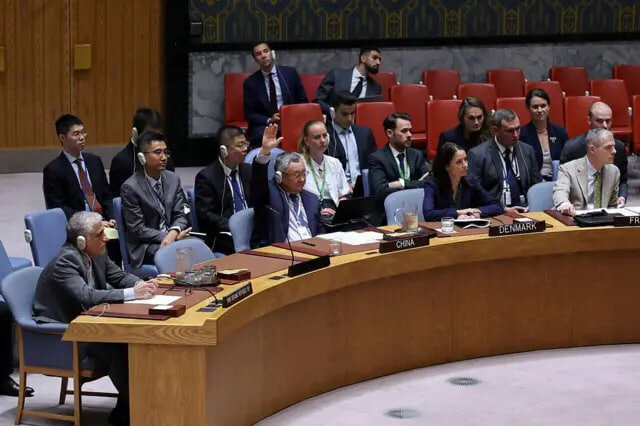'US betrayed diplomacy. Europe buried it'
Iranian officials decry UNSC vote as ‘illegal’ farce, vow snapback will fail

TEHRAN – After a controversial voting at the UN Security Council on Friday, senior Iranian officials have inveighed against the decision to reimpose pre-JCPOA UN sanctions on the country, labeling the move an “immoral and illegal” act of bad faith that undermines international law and diplomacy.
The vote rejected a Russian and Chinese draft resolution that would have extended sanctions relief for Iran for six months, thereby preventing the incoming reimposition, or "snapback," of all previous UN sanctions. The so-called snapback mechanism was triggered in late August by Britain, France, and Germany (the E3), despite these countries being original signatories to the JCPOA, the 2015 nuclear deal they have worked to dismantle during the recent months of diplomatic disputes over the issue.
Iranian President Masound Pezeshkian, meeting with UN Secretary-General Antonio Guterres in New York, denounced the move as the direct result of American pressure and European capitulation. “The implementation of the snapback mechanism and return of sanctions, despite Iran’s compliance and opposition from Russia and China, is both immoral and illegal,” Pezeshkian stated. He urged the UN chief to use his authority to prevent this action, which he argued rewards American unilateralism and punishes Iranian compliance.
The President also contrasted the swift move to sanction Iran with the Security Council’s continued failure to stop Israel’s ongoing genocide in Gaza, an accusation first put forth against the regime by the International Court of Justice, and confirmed by the UN itself this month. Pezeshkian said there is a glaring double standard in the international body’s application of justice.
Iran’s Foreign Minister, Abbas Araghchi, was even more pointed in his remarks following the vote. Addressing journalists, he laid out a methodical case against the E3 and the United States, placing the blame for the current crisis squarely on their shoulders. “Today’s crisis is the direct result of U.S. withdrawal and Europe’s inaction. The U.S. betrayed diplomacy. The E3 buried it,” Araghchi declared.
He reminded the world that the International Atomic Energy Agency (IAEA) issued 15 consecutive reports confirming Iran’s full compliance with the 2015 Joint Comprehensive Plan of Action (JCPOA). He detailed how Iran only began scaling back its own commitments a full year after the U.S. illegally withdrew from the deal in 2018, and only after the E3 failed to honor their own economic promises to Tehran.
Araghchi also highlighted the context of “state terrorism” – referring to the June U.S-Israeli attacks on Iranian nuclear facilities and the assassination of scientists – that Iran endured without a word of condemnation from its European counterparts. Despite this, he noted, Iran continued to act in good faith, recently signing a new cooperation framework with the IAEA on September 9.
“The E3, having breached the deal, cannot claim ‘significant non-performance’,” Araghchi argued, declaring the snapback “illegal, void, and has no standing.” He concluded with a warning: “Military attacks have failed. Snapback will fail, too. The only solution is dialogue… Iran will never bow to pressure. We respond only to respect.”
In a clear sign of Tehran’s displeasure, the Iranian Foreign Ministry announced on Saturday that it has summoned its ambassadors to Germany, France, and the UK for consultations.
The JCPOA, a landmark agreement reached in 2015 after years of negotiation, saw Iran agree to stringent limits on its nuclear program in exchange for the lifting of punishing sanctions. The deal was unanimously endorsed by the UN Security Council in Resolution 2231.
The current crisis began in 2018 when the Trump administration unilaterally withdrew the U.S. from the agreement and reimposed harsh sanctions. While the E3 initially expressed regret, they ultimately failed to create a financial mechanism to shield legitimate trade with Iran from U.S. penalties, effectively reneging on their own commitments. After patiently waiting for over a year, Iran began a gradual and reversible reduction of its JCPOA obligations.
The “snapback” mechanism, a provision within Resolution 2231, was designed to automatically reimpose sanctions if Iran was found to be in violation of the deal. However, the E3’s use of this mechanism is considered highly contentious, as the U.S., having left the deal, claims it no longer participates, while Iran and other signatories argue the European move is an abuse of process aimed at killing the agreement for good.
Iran has said that once the UN sanctions return, it would dump the deal it signed with the IAEA in Cairo, and indefinitely suspend cooperation with the nuclear agency. Lawmakers, however, have asked for more measures, like leaving the Non-Proliferation (NPT) Treaty.
